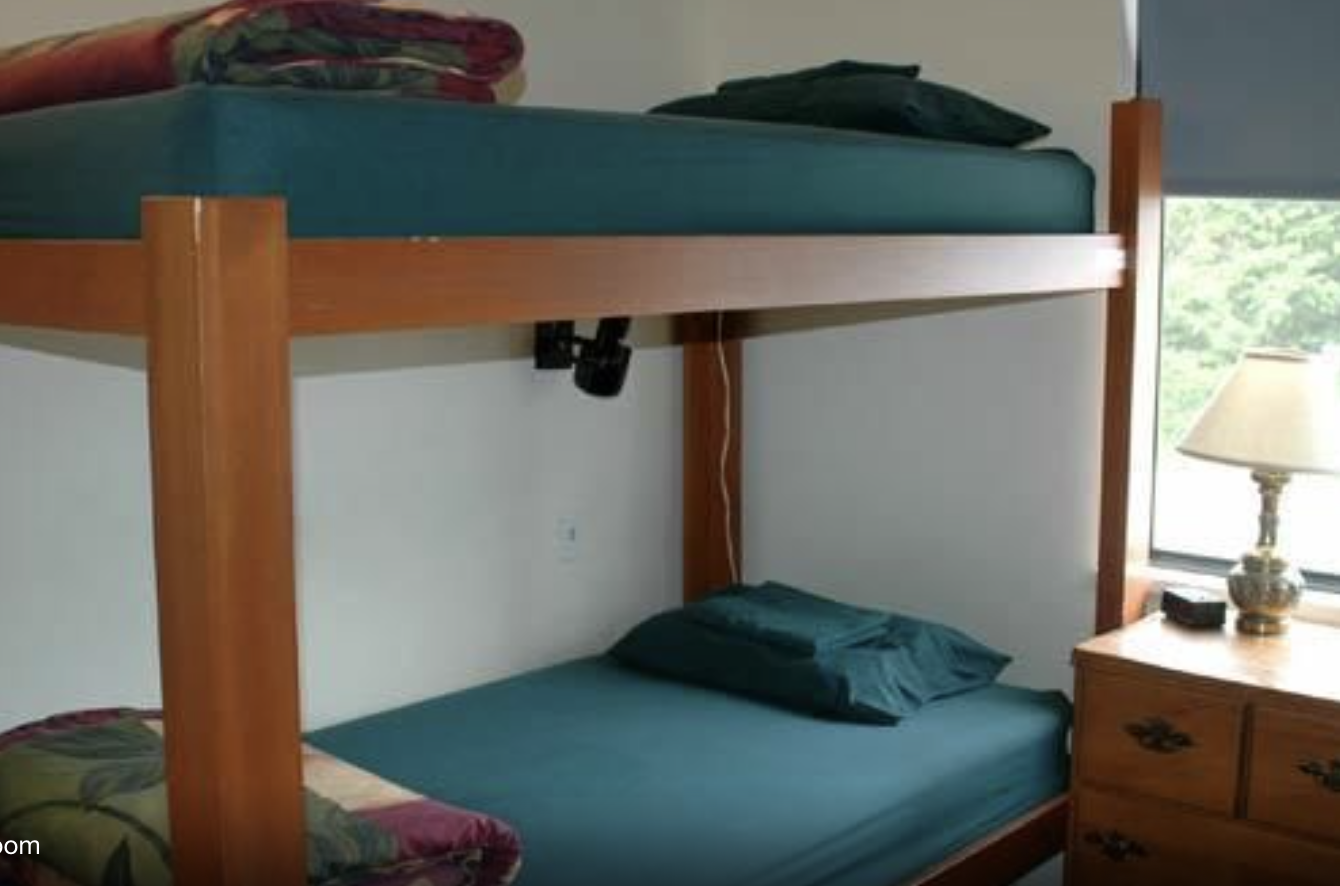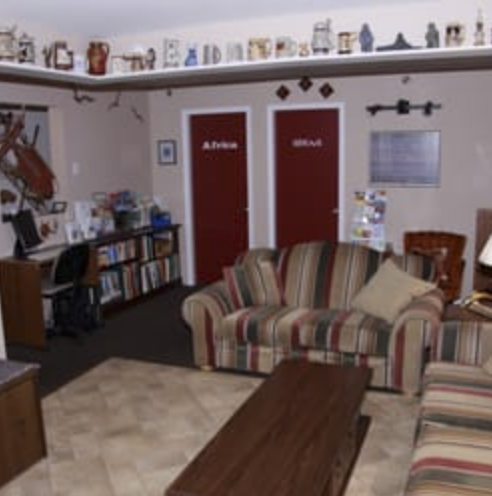
Shelter hopes to move to The Upper Deck on Wharf St. by end of December; RainCity looking for more staff
By Margot Grant
The homeless shelter at St. Hilda’s in Sechelt is at capacity.
It has only one sleeping area, with mats tightly fitted together, and the population is changing, says shelter manager Nick Gaskin. Sixty per cent of the clients are over 55, and at least thirty per cent are women. In addition, for the first time he is seeing couples with dogs.
Statistics Canada found that in 2015, the average monthly rent on the Coast was $1,051; it has since climbed to $1,531.
“It is a myth that people at the shelter are addicts,” Gaskin says. “These are people who can’t find housing on the Coast. At least six of the clients work.”
Nor is the shortage of accommodation not restricted to Sechelt: the hospital in Powell River recently inquired if it could send four women to the Sechelt shelter because there is no shelter there.
And the squeeze is getting tighter: St. Hilda’s recently asked staff to limit the number of clients to 15.
“It’s a safety issue,” says Gaskin. “People had to climb over one another if they wanted to go to the bathroom. And in this season, there is a very serious risk of an outbreak of flu, or other illnesses when people are sleeping so close together.
“There is a nasty strain of Australian flu going around, and homeless people don’t have a good immune system. They get one good meal at the shelter, but breakfast is toast, frankly, and they may not have access to food during the day.”
To prevent disease, staff members clean the floor with bleach every morning after the mattresses have been stacked away, disinfect the toilets and sanitize door handles.
“But most folks are still at risk,” says Gaskin, who is program manager for RainCity Housing’s homelessness services on the Sunshine Coast. “It sucks.”
Because of the lack of rentals on the Coast, people are staying at the shelter for longer periods. ”It’s quite sad some of them actually call this place ‘home’,” he says.
Between 8 am and 4 pm, the shelter is closed and the clients are pounding the pavement.
“Somebody recently told me that five years ago, he hardly saw homeless people in Sechelt. Now he sees a number of them; they are easy to spot. One man, for example, walks the same route every day, in the same clothes. It’s a shame to see clients stigmatized like that.”

The arrival of clients with dogs presents a new problem for the shelter: they can bark while people are trying to sleep, they may run around, and some people might be allergic, so the dogs have to sleep outside, tied to a chain link fence with a tarp draped over it, but no shelter from the wind and rain.
Gaskin has made construction of a large doghouse a priority and is looking for donations of lumber to give the dogs a roof over their heads.
Whole the shelter struggles to accommodate pets, the community has been less than supportive to their owners: BC Housing intends to build a temporary homeless shelter at the corner of Trail Avenue and Ebbtide Street, but has met with fierce opposition from people in the neighbourhood.
So when Tanya Hall, owner of The Upper Deck hostel on Wharf Street, attended the most recent open house, she realized the shelter would probably not get off the ground soon and wondered if her hostel might be an immediate solution. She approached BC Housing with a proposal to use it as a shelter for the winter and BC Housing jumped on her plan, offering to lease the building for two years.
“I absolutely support this,” Hall says. “It’s the only solution I can see for now. Everything is already there. This will definitely happen a lot faster than the original plan.”
Hall will move out of her own apartment to make room for shelter staff. The Upper Deck had good occupancy, she says, but she is confident the temporary workers and backpackers who stayed there will find somewhere else to stay.
The change requires a rezoning for “shelter residential,” but Hall does not expect problems. “Fifteen years ago, when I needed rezoning for a hostel, there was a lot of opposition, but there has never been a problem after it opened. People may look back and realize it was a bit of a waste of time.”
The Upper Deck could open as a shelter before the end of the year. The District of Sechelt’s Advisory Planning Commission has recommended that the Planning and Community Development Committee (PCDC) approve the rezoning on November 22. After a public information meeting by BC Housing, the item could be on council’s agenda on December 6 for first reading. A public hearing is potentially scheduled for December 19, with second, third and final readings on December 20 if all members of council are at the public hearing, municipal planner Angela Letman told The Coast Clarion. The rezoning could also be adopted at a special council meeting, she indicated.

Gaskin looks forward to The Upper Deck. It has six rooms, with shared bathrooms, there is a lounge with sofas, a computer, wifi, television, books, laundry facilities, and three meals a day can be prepared in the communal kitchen.
It can accommodate 20 clients, plus two staff in Hall’s apartment, and men and women will have separate rooms. Lots of women do not use the shelter at St. Hilda’s because they come from situations of violence and oppression and can’t imagine sleeping next to men they don’t know, Gaskin says. The Upper Deck will also allow dogs in some rooms.
There will be eight people on duty every day and clients will help staff. Peer projects, with clients working in the community, will provide work experience, and Hall says part of the property can be used to grow food for the shelter.
Gaskin is also happy that the clients can stay at the hostel all day if needed. “We try to help them with access to health care, referrals and references. The present shelter only opens at 4 pm, and by the time everyone is settled, it is 4:30 and everything is closed.”

Because The Upper Deck will be open 24/7, RainCity Housing is looking to hire more staff, and anybody with a kind heart can apply, says Gaskin: check the RainCity website for details.
As happy as he is with The Upper Deck, Gaskin points out that 20 beds is not enough. The temporary shelter at Trail and Ebbtide, with 35 to 40 beds, is still the objective. “We know of 90 people who are living in tents right now, in this weather.”
BC Housing has submitted a request for a lease for a temporary shelter at the corner of Trail and Ebbtide on October 17, but to date has not received a response from the District. Following approval to lease, a re-zoning application and Official Community Plan amendment would be required.
“This is a process that can take many months,” BC Housing said in an email.
BC Housing has also purchased a site on Hightide Avenue and plans to submit a proposal for the development of a 35-40-unit supported housing project for people on the Sunshine Coast who are homeless or at risk of homelessness.
Hopefully, Habitat for Humanity can provide funding or means of fundraising for the new housing. Wondering if storage container units could be used to build the new unit. Other countries have been using containers for shelters, student housing and some pretty fancy single family dwellings.
I don’t think Habitat for Humanity is in the business of helping homeless people. It is my understanding that, to qualify for a Habitat for Humanity house (which the recipient will own), the recipient needs to put in “sweat equity” (i.e. help with construction) plus I think they need to pay a mortgage geared to their income. It is not for the most desperate. It is geared to working people who probably could have bought their own home in past decades before the cost of housing got ridiculous! Plus, it takes months to build a house–people need shelter now.
This is such a sad state, I have some materials for the dog shelter and I am sure I could get more from friends etc. Come on people, lets help out.
Tanya Hall, huge hugs to you; but I’m horrified that this nightmarish situation still exists on the Sunshine Coast. Imagine trying to sleep in a tent week after week in weather like this! Years ago, when I had to leave an impossible housing situation and was facing homelessness, a counselor suggested I buy a tent at Canadian Tire and camp out at one of the government campsites with my old black Labrador Retriever I had at that time. I had almost no money; I was traumatized from an earlier, spirit-destroying ‘therapy’ experience which had left me so desperate I’d attempted suicide more than once; I was physically vulnerable, a 5′ 3″ woman weighing in at 105 pounds soaking wet (which I would have been, sooner or later, given the weather conditions on the Coast!); I had no car, no realistic way of getting the groceries I needed for myself and my dog, much less safely storing them in a tent or being able to keep appointments while having to leave my pooch back at the campsite on his own–yet somehow it was assumed that I would be able to cope, with some new-found sunny mindset I was expected to instantly develop that would miraculously solve problems which even someone with ideal mental health would have found it difficult to deal with. I simply could not comprehend, over ten years ago, how people of the Sunshine Coast could allow situations like this to go on–yet they’re STILL going on! ‘Fierce opposition’?! Where’s your heart, people?! This could be your son, daughter, or even yourself caught up in a desperate situation like this! Sorry for the rant, but this infuriates me. I remember talking to that homeless person several times, the one who froze to death on that bus stop bench in Gibsons. When he was sober, he was such a sweet guy. I have 35 years of sobriety (I know I’m not supposed to talk about it), and I know what that craving for alcohol is like, when your life feels dead-ended and your self-esteem is sub-zero. It’s a cliche, for sure, but it’s so easy to judge a person if you haven’t had to walk in their shoes. As to more temporary housing becoming available only by the end of December–are you kidding me?! Look outside! My apologies again; I know that so many people reading this care deeply about the problem, and that people who oppose shelters have probably simply never been in a desperate situation around housing, and don’t realize that they or their loved ones could become homeless themselves, given a right turn or two at Albuquerque….